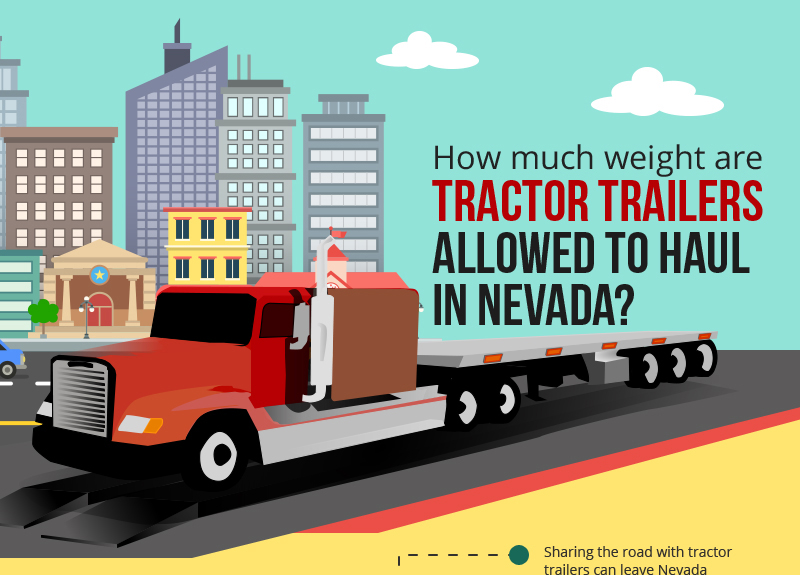Sharing the road with tractor trailers can leave Nevada drivers facing a significant risk of accidents. These massive vehicles dramatically outweigh passenger vehicles, and they are less responsive to driver input in emergency situations. Many of these issues are compounded when tractor trailers are overloaded, as any Las Vegas truck accident attorney would agree.
(Article continues below Infographic)

To address this safety hazard, state and federal regulations limit the amount of weight these vehicles can haul. Unfortunately, when these regulations are violated, the risk of accidents and devastating outcomes may increase significantly.
Weight restrictions
Tractor trailers operating on roadways in Nevada must comply with weight limitations established under the Nevada Revised Statutes. In general, weight restrictions per axle are as follows:
- The weight on any single axle cannot exceed 22,000 pounds.
- The weight on a tandem axle cannot be greater than 34,000 pounds.
- The weight per tire, expressed in pounds of weight per square inch of tire width, cannot exceed 600 for steering axles.
- The weight per tire, expressed in the same units, cannot be greater than 500 for other axles.
The statutes also limit the amount of weight a tractor trailer can carry on consecutive axles. This restriction is based on the total weight, number of axles and distance between axles.
Some tractor trailers, including licensed garbage and refuse hauling vehicles, may qualify for exemptions. However, as a Las Vegas truck accident attorney knows, all tractor trailers must adhere to federal regulations while traveling on federal highways. These regulations limit the weight on any single or tandem axle to, respectively, 20,000 pounds or 34,000 pounds. Federal regulations also restrict the overall vehicle weight to 80,000 pounds.
Other limitations
In Nevada, tractor trailers additionally must comply with vehicle and load size restrictions specified in the Revised Statutes. In general, these vehicles cannot have loads or overall heights exceeding 14 feet, as measured from the ground. Any vehicle with a trailer attached cannot have a total length longer than 70 feet. Tractor trailer widths also cannot extend past 10 feet.
Vehicles may exceed these regulated weights or dimensions if they hold special permits. Unfortunately, when vehicles surpass these limitations, whether lawfully or not, the risk of accidents may increase greatly. Excessive weights and load sizes can have adverse and potentially catastrophic effects on steering capability, braking power and various vehicle components.
Risks of overloading
The steering and braking ability of tractor trailers is reduced when these vehicles are carrying large weights. Momentum increases with weight, and as a result, heavier tractor trailers require a greater distance to stop. The Insurance Institute for Highway Safety states that loaded tractor trailers may require at least 40 percent more stopping distance than passenger vehicles.
Excessive freight loads can worsen this problem and decrease the likelihood that a tractor trailer will stop in time to avoid a collision. This risk may be especially pronounced when roads are wet or slippery. Unfortunately, overloading also can put extra strain on vehicle components, such as the brakes and tires. As any Las Vegas truck accident attorney might note, this increases the likelihood of parts failure and associated accidents.
Equipment breakdown
Brake failure is a common factor in large truck accidents, according to data from the Federal Motor Carrier Safety Administration. The FMCSA’s Large Truck Crash Causation Study concluded that 29.4 percent of the large truck crashes reviewed during the study involved brake failure or similar issues.
Tire blowouts also become more likely when tractor trailers are overloaded. These blowouts may already be a risk in Nevada, given the state’s high speed limits. Modern truck tires are not designed for speeds exceeding 75 mph; consequently, the risk of blowouts increases at higher speeds. In Nevada, the maximum legal speed limit is 75 mph. Tractor trailers that exceed this limit are more likely to experience blowouts, especially if they are overloaded.
Catastrophic accidents
Tragically, when tractor trailers violate weight restrictions, any subsequent accidents are more likely to be severe. The amount of energy released during a crash depends primarily on the speed and weight of the involved vehicles. As crash energy rises, the risk of vehicle damage and injury to vehicle occupants increases.
The consequences of tractor trailer accidents can be especially devastating for other road users. According to the IIHS, large trucks may outweigh passenger vehicles by 20 to 30 times. As a result, other road users are significantly more likely to suffer severe injuries or death in accidents involving these vehicles.
A review of the fatal truck accidents reported across the U.S. in 2013 illustrates the disproportionate effects these accidents have on other drivers. In 82 percent of these accidents, people other than truck drivers were fatally injured. In accidents involving a truck and one other vehicle, 97 percent of the fatality victims were people in the other vehicles.
Establishing negligence
When careless or illegal practices on the part of tractor trailer drivers or trucking companies lead to accidents, victims may have recourse. As any Las Vegas truck accident attorney knows, establishing negligence may be simpler when a tractor trailer was violating state laws or federal regulations. When an accident occurs because one party was violating a legal ordinance, that party may be considered liable under the doctrine of negligence per se.
Carrying excessive loads and operating with unsafe vehicle parts are two practices that may be considered negligent. A formal citation of these violations is not necessary to support an accident victim’s claim. If adequate proof of the violations exists, a tractor trailer driver or trucking company may be found liable.
Even with these criteria, securing evidence after a truck accident and establishing negligence is often complex. Consequently, accident victims may benefit from seeking the assistance of a trucking accident attorney.





